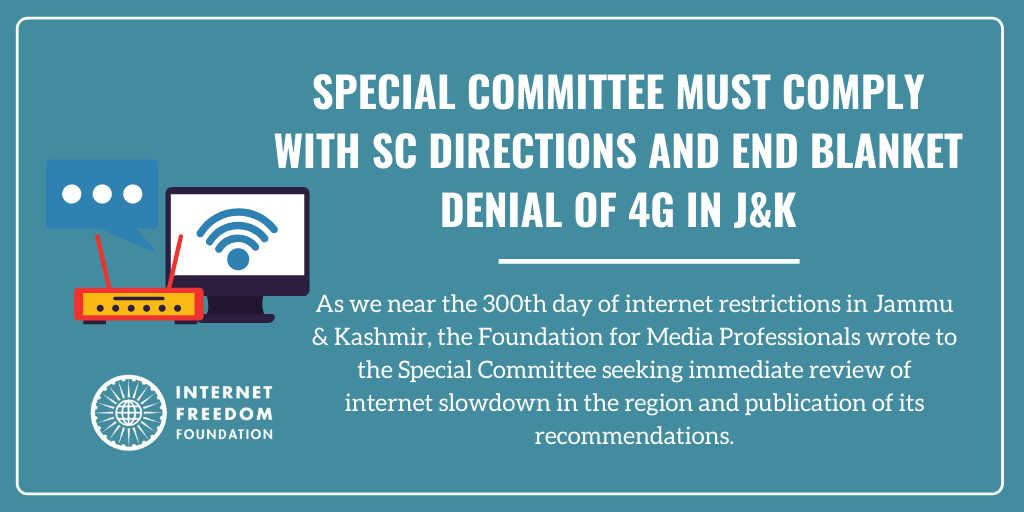
Tl;dr
One day after the internet slowdown in Jammu & Kashmir was extended till 17 June 2020, Foundation for Media Professionals (FMP) wrote to the Special Committee established by the Supreme Court to examine the issue of internet restrictions in the region. Despite being directed by the Supreme Court on 11 May 2020 to immediately determine the issue, the Special Committee has failed to take any action in almost three weeks. Therefore, on 28 May 2020, FMP wrote to members of the Special Committee seeking immediate review of internet restrictions in Jammu & Kashmir within 7 working days and urged the Committee to publish its recommendation rejecting/modifying/accepting the order issued by the government on 27 May 2020.
Background
Tomorrow will mark the 300th day of restrictions on internet access in Jammu & Kashmir since they were intially imposed on 5 August 2019. What began as a total communication shutdown with even landlines being snapped has gradually changed to an internet slowdown in the region but in 2020, having an outdated 2G connection hardly constitutes meaningful internet access. The denial of 4G internet services has caused immense hardship to the people of Jammu & Kashmir especially during the COVID-19 crisis during which the internet has emerged as a lifeline. Without access to reliable and high speed mobile internet, the residents of Jammu & Kashmir are being deprived of telemedicine, online learning and the ability to work remotely.
Failure to Comply with SC Directions
Taking note of the difficulties caused by the internet slowdown, the Supreme Court had established a Special Committee consisting of MHA Secretary, DoT Secretary and Chief Secretary, J&K to "immediately determine" whether it was necessary to continue restrictions on internet access in Jammu & Kashmir. These directions were issued by the Supreme Court in a petition filed by Foundation for Media Professionals, for which IFF retained counsels provided legal assistance. In its judgement, the Supreme Court also directed the Special Committee to examine the material produced by the petitioners and consider the availability of less restrictive alternatives such as narrowing down the scope of internet restrictions to specific districts for a limited period of time (Read more here).
Despite the Supreme Court categorically directing the Special Committee to "immediately determine" the issue of restoration of 4G internet in Jammu & Kashmir, there has been no action by the Special Committee and nearly three weeks have passed since the Supreme Court delivered its judgement on 11 May 2020. To the best of our knowledge, there is no publicly available information about whether the Special Committee has even had a meeting during this period.
Renewal of Internet Restrictions
On 27 May 2020, a new order was issued by the Govt of U.T. of Jammu & Kashmir directing internet service providers to continue slowing down mobile internet speed in all districts to 2G till 17 June 2020. The order claims that speed restrictions are necessary to prevent terrorism but there is no rational connection between internet access and rise in terrorism because as the order itself notes, there have been several encounters between army personnel and militants even during the past two weeks when severe internet restrictions were in place. Further, the order only references an incident in Srinagar and it fails to provide any material basis to demonstrate that there is a threat to public safety in all districts of Jammu & Kashmir. Finally, despite there being ample evidence to the contrary, the order incorrectly claims that internet restrictions have not impeded COVID control measures and people can access mobile apps, online educational content and carry out business activities.
Demand for Immediate Review and Restoration
On 28 May 2020, the Foundation for Media Professionals wrote to members of the Special Committee seeking immediate review of internet restrictions in Jammu & Kashmir which have been renewed by the order issued on 27 May 2020. In its previous judgement in Anuradha Bhasin v. Union of India, the Supreme Court had held that orders under the Telecom Suspension Rules must be periodically reviewed every seven working days. Relying on this, FMP has urged the Special Committee to undertake a review of the order issued on 27 May 2020 within 7 working days and publish its recommendation rejecting/modifying/accepting the order.
IFF provided drafting assistance for this representation and we will keep pushing the Special Committee till it complies with the Supreme Court's directions in letter and spirit. We can only imagine what the people of Jammu & Kashmir have endured during this prolonged period of internet disruptions and we will continue our advocacy within and outside courtrooms till 4G internet is restored in the region.
